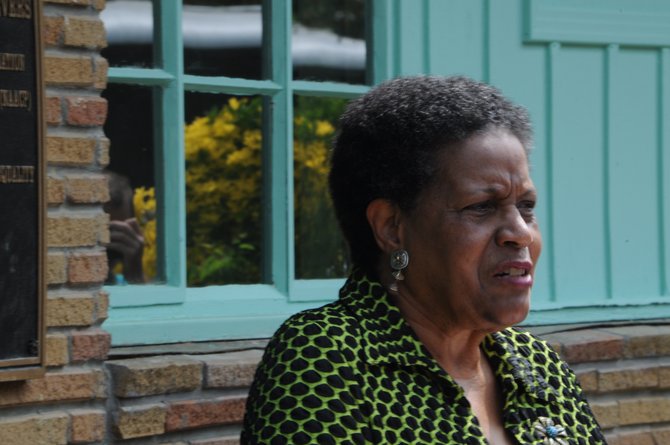Myrlie Evers-Williams, now a scholar-in-residence at Alcorn State University in Lorman, attended a 50th commemoration of Medgar's assassination this morning in Jackson. Photo by Trip Burns
The story of Medgar Evers' assassination 50 years ago is well-known—particularly to people in Jackson, where the murder took place—but there's something about hearing his widow, Myrlie, recount the night of June 12, 1963.
"They knew the sound of the motor," Myrlie Evers-Williams said of their children, speaking this morning outside her former home on what is now Margaret Walker Alexander Drive in west Jackson.
"Medgar had made a promise that he would always come home a different way—from that end or this end of the street—and that he would never get out of the car on the driver's side because of the threats that had been made, the firebombing of this house. That night, tired and literally worn out, he got out on the driver's side. And as soon as the children said, 'There's daddy," the shot rang out—one the loudest and most powerful I had, and still have, ever heard in my life, and I knew exactly what happened."
What happened is that Evers, then the field secretary for the Mississippi branch of the NAACP, which was engaged in a massive voter registration drive, fell victim to assassin Byron de La Beckwith, a member of the Ku Klux Klan.
Evers said a bullet ricocheted through the living room window, bounced off a wall and the refrigerator, landing next to a watermelon—evidence of the southernness of the crime against her husband.
Evers-Williams, now a scholar-in-residence at Alcorn State University in Lorman, attended a 50th commemoration of Medgar's assassination this morning in Jackson.
Derrick Johnson, president of the Mississippi state Conference NAACP compared the voter-registration work Medgar Evers was doing 50 years ago to ongoing efforts to improve working conditions at Mississippi factories, including at the Nissan plant in Canton. The NAACP is involved in the ongoing effort to unionize the plant, which is celebrating its 10th anniversary this year.
Benjamin Jealous, the national president of the NAACP—which held its national board meeting in Jackson for the first time in three decades—called Medgar Evers a general on the most violent battlefield of the Civil Rights Movement.
"Our children deserve to grow up in a country whose soul is healed from the scars and violence of racism and racial oppression and so many other forms of oppression that mar our country," Jealous said.



Comments